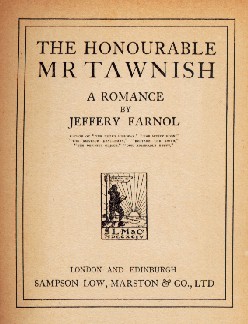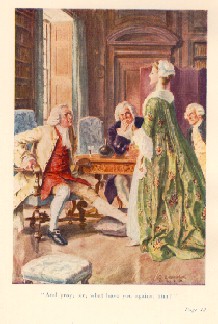



In a recent interview (in the April issue #36 of Aberrations magazine) Vance mentioned several times that he was influenced by the work of Jeffery Farnol. I accepted the challenge, purchased the cheapest first edition I could find, and read it in two evenings. Written in 1913, The Honourable Mr Tawnish takes place in 1740, which seems to allow for some interesting dialogue.Some minor spoilers follow, but hopefully nothing that will detract from the enjoyment of the clever dialogue and surprising plot twists. Note also that in school I avoided writing book reports with great success, so remember that this is very difficult for me. I welcome additions, corrections and (some) criticism.
The first similarity to Vance's work I noticed was in the dialogue. In the first chapter, Mr Tawnish enters a tavern, and introduces himself to the father (Jack) of a woman he is wooing, and is told that he should "cease your persecution of her once and for all." He replies:
"Alas!" sighs Mr Tawnish, "cheat myself as I may, the possibility will obtrude itself that you do not look upon my suit with quite the degree of warmth I had hoped."Mr Tawnish (the period after "Mr" is not used in the book) then proceeds to compare himself favorably with some roughnecks in the tavern, which unfortunately for him are good friends of Jack. Mr Tawnish replies:"I fear my ignorance of country ways hath led me into a grave error," says Mr Tawnish, with a scarce perceptible shrug of the shoulders; "upon second thoughts I grant there is about a man who can put down one throat what should suffice for six, something great."There is not a great deal of this kind of dialogue, unfortunately, but the similarity of style to Vance's dialogue in the "Cugel" books is striking.
The second similarity was in characterization. Mr Tawnish appears to be a clever, supercilious fop. The gist of the story is that he must prove his "manhood", which he performs without sacrificing his dignity or his ability to speak in complete paragraphs. Jack, his nemesis, appears to be an unthinking brute ruled by his emotions. There is also a true villain who is portrayed as being not very clever.
Vance also used the contrast between the intelligent person who disdains violence and the lout to a similar effect in the "Cugel" and "Magnus Ridolph" stories. It is not hard to see where the reader's sympathies are supposed to lie, even though Jack is basically a good person (as were many of Cugel's adversaries.)
Jack's daughter is a surprisingly interesting character, but her appearances are all too brief. It's difficult to compare her to Vance's female characters, except that they are both rare.
Interestingly, the whole story is told in first person, by someone who is only tangentially germane to the plot; an onlooker. I don't think Vance used this technique at all.
The final similarity was in plot. It was fairly unimportant, except for the surprise ending. The main feature of the book was the exploration of the main characters, and the surprise ending was an added bonus. It seems to me that many Vance books are constructed that way, with the loose ends tied up almost as an afterthought.
Having said all this, I realize that I've read only one of Farnol's many books; perhaps even one that Vance never read. I am currently trying to find a copy of what is apparently one of Farnol's most well-known books, The Broad Highway, and will report on it when I've succeeded.
A Farnol bibliography is available at http://cres1.lancs.ac.uk/~esarie/farnol.htm.